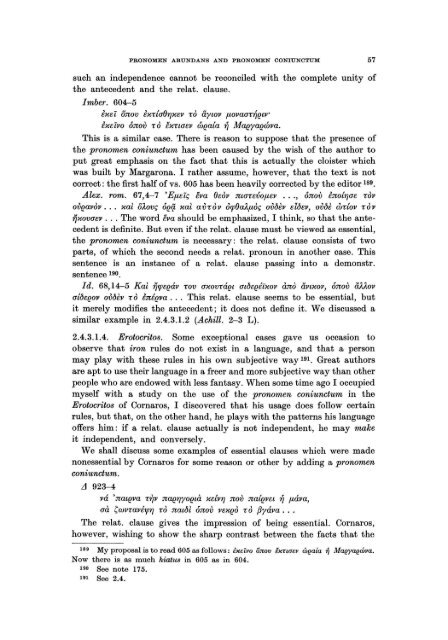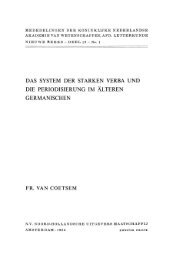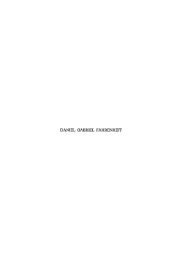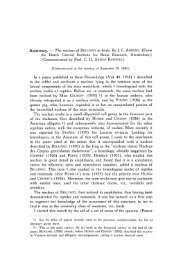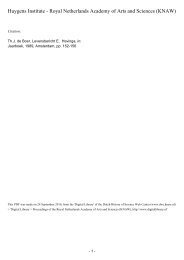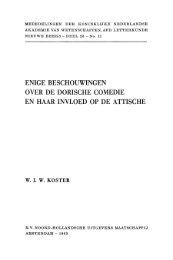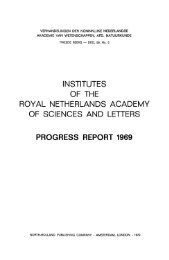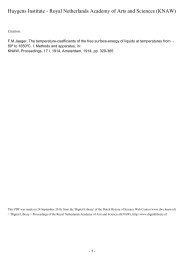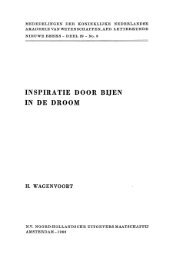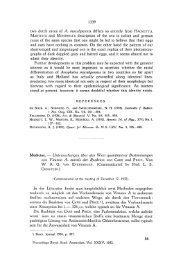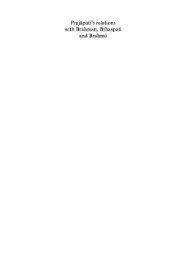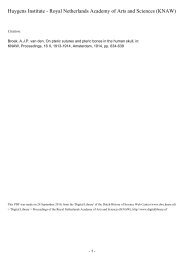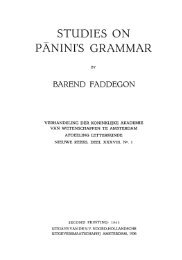Pronomen Abundans and Pronomen Coniunctum. A ... - DWC
Pronomen Abundans and Pronomen Coniunctum. A ... - DWC
Pronomen Abundans and Pronomen Coniunctum. A ... - DWC
Create successful ePaper yourself
Turn your PDF publications into a flip-book with our unique Google optimized e-Paper software.
PRONOMEN ABUNDANS AND PRONOMEN CONIUNCTUM 57<br />
such an independence cannot be reconciled with the complete unity of<br />
the antecedent <strong>and</strong> the relat. clause.<br />
1 mber. 604-5<br />
bu; ï ö;rcov è"da{)'YJ'uov .0 a.ywv flovaa.rietv·<br />
è"ûvo ónov .0 g"naev ÓJeaîa ij Maeyaewva.<br />
This is a similar case. There is reason to suppose that the presence of<br />
the pronomen coniunctum has been caused by the wish of the author to<br />
put great emphasis on the fact that this is actually the cloister which<br />
was built by Margarona. I rather assume, however, that the text is not<br />
correct: the first half of vs. 605 has been heavily corrected by the editor 189.<br />
Alex. rom. 67,4-7 'EflûÇ [va {)eov mauvoflev "', ónov ènoî'YJae .ov<br />
oveavov . .. "al ö).ovç óefi. "al av.ov oqJ{)a).floç oVCJèv ûCJev, oVCJè wdov .ov<br />
if"ovaev . . . The word I!va should be emphasized, I think, so that the antecedent<br />
is definite. But even if the relat. clause must be viewed as essential,<br />
the pronomen coniunctum is necessary: the relat. clause consists of two<br />
parts, of which the second needs arelat. pronoun in another case. This<br />
sentence is an instance of arelat. clause passing into a demonstr.<br />
sentence 190.<br />
Id. 68,14-5 Kal ifqJeeáv .ov a"ov.áet GtCJeeü"ov àno I:1.vt"OV, ónov 1:1.).).ov<br />
atCJeeov oVCJèv .0 ènieva ... This relat. clause seems to be essential, but<br />
it merely modifies the antecedent; it does not define it. We discussed a<br />
similar example in 2.4.3.1.2 (Achill. 2-3 L).<br />
2.4.3.1.4. Erotocrito8. Some exceptional cases gave us occasion to<br />
observe that iron rules do not exist in a language, <strong>and</strong> that a person<br />
may play with these rules in his own subjective way 191 . Great authors<br />
are apt to use their language in a freer <strong>and</strong> more subjective way than other<br />
people who are endowed with less fantasy. When some time ago I occupied<br />
myself with a study on the use of the pronomen coniunctum in the<br />
Erotocrito8 of Cornaros, I discovered that his usage does follow certain<br />
rules, but that, on the other h<strong>and</strong>, he plays with the patterns his language<br />
offers him: if arelat. clause actually is not independent, he may make<br />
it independent, <strong>and</strong> conversely.<br />
We shall discuss some examples of essential clauses which were made<br />
nonessential by Cornaros for some reason or other by adding a pronomen<br />
coniunctum.<br />
LI 923-4<br />
vá 'nateva .ijv nae'YJyoetà "etv'YJ nov nateVet ij fláva,<br />
aà Cwv-ravi"P'YJ .0 natCJl ónov ve"eo .0 f3yáva . ..<br />
The relat. clause gives the impression of being essential. Cornaros,<br />
however, wishing to show the sharp contrast between the fa cts that the<br />
189 My proposal is to read 605 as follows: i"ûvo önov l"nGev wea{a 1] Maeyaewva.<br />
Now there is as much hiatus in 605 as in 604.<br />
190 See note 175.<br />
191 See 2.4.


